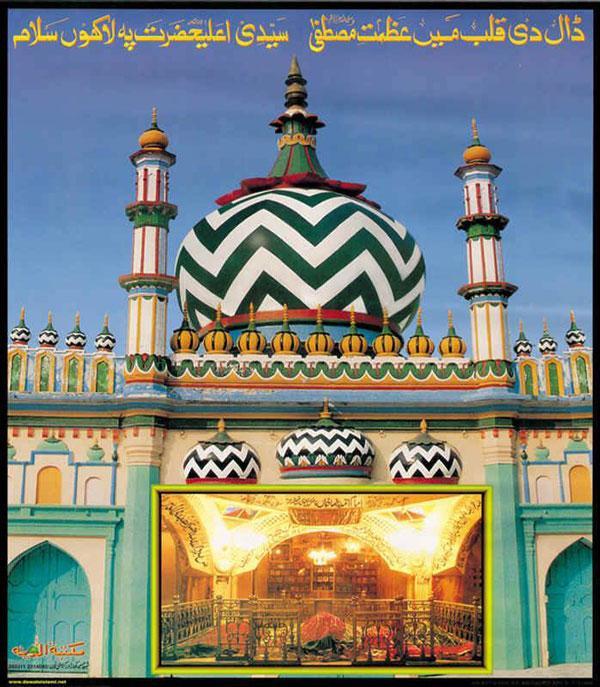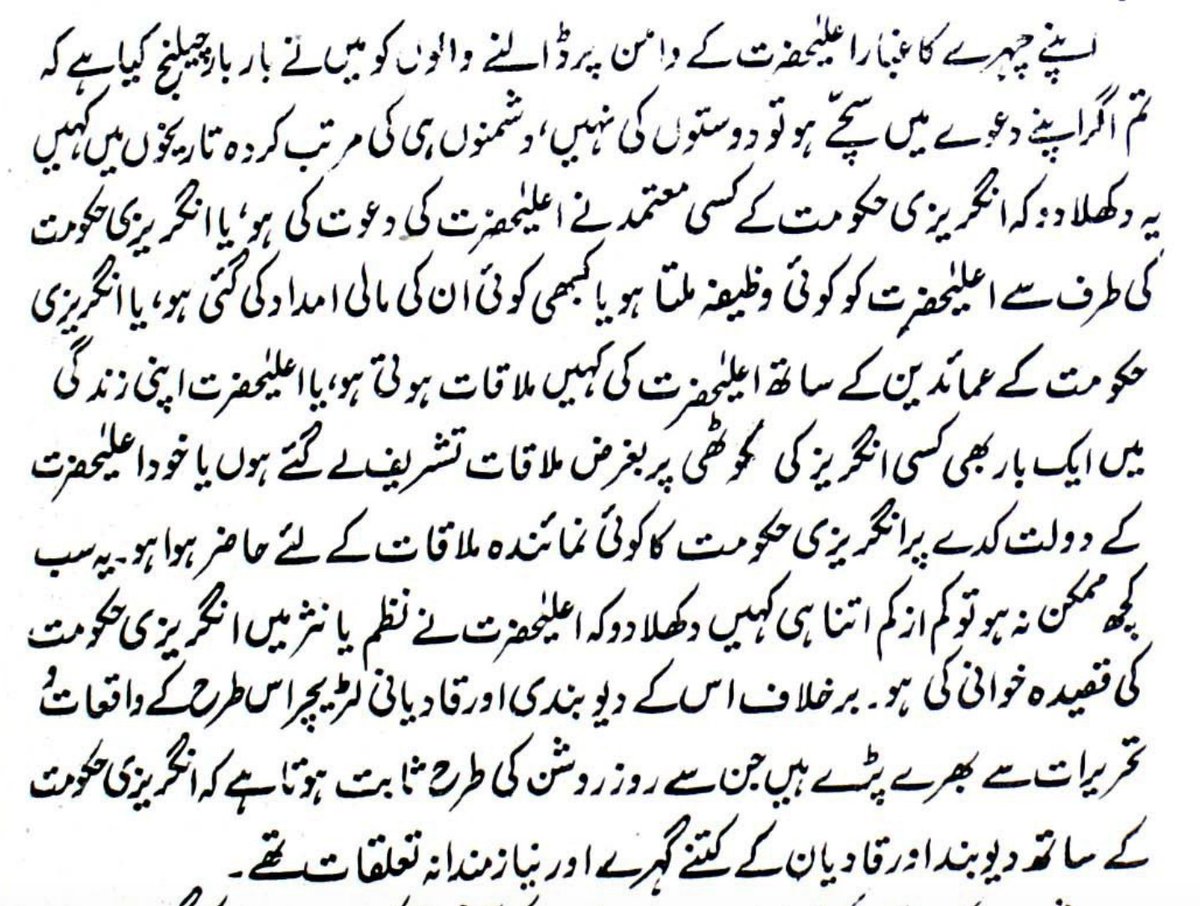
RULING ON CELEBRATING, WISHING AND GIFTING KĀFIRS ON THEIR FESTIVALS
Shaykh Badruddīn Maĥmūd al-Sīmāwī al-Ĥanafī [d. 823 AH / 1420 CE] writes in Jāmiý al-Fuşūlayn:
❝Abū Bakr ibn Ţarkhān stated:
❛Whoever left towards Suddah (Álī al-Qārī said that it means a gathering of
Shaykh Badruddīn Maĥmūd al-Sīmāwī al-Ĥanafī [d. 823 AH / 1420 CE] writes in Jāmiý al-Fuşūlayn:
❝Abū Bakr ibn Ţarkhān stated:
❛Whoever left towards Suddah (Álī al-Qārī said that it means a gathering of

the people of Kufr) has committed Kufr, as in it there is an announcement of Kufr, and it is as if he has helped in it (i.e. Kufr). Upon the qiyās of Suddah, going out on Nayrūz and doing as they do on that day is Kufr.❞
This is also mentioned in Minaĥ al-Rawđ al-Az’har.
This is also mentioned in Minaĥ al-Rawđ al-Az’har.
Mujaddid Alf Thānī Imām Rabbānī Aĥmad al-Fārūqī al-Sirhindī al-Naqshbandī al-Ĥanafī [971-1034 AH / 1564-1634 CE] writes in one of his Maktūbāt:
❝And honouring the respected days of the Hindus and in those days enacting the known rituals of Hindus also accentuates Shirk

❝And honouring the respected days of the Hindus and in those days enacting the known rituals of Hindus also accentuates Shirk


necessitates (the ruling of) Kufr; as on the Diwālī of Kāfirs, Jāhil Muslims (i.e. Muslims by name only), especially their womenfolk, gleefully enact their rituals and celebrate it as their Eid; and gift like the Kāfirs gift, they send their daughters and sisters gifts,
and colour their pots during these days like the Kāfirs do, and fill them up with red-coloured rice and send to each other, and especially trust and respect these days – this is all Shirk and Kufr from Dīn-i-Islām.❞
[Maktūbāt, Volume 3, Letter 41]
[Maktūbāt, Volume 3, Letter 41]
Állāmah Muĥammad Álāuddīn al-Ĥaşkafī al-Ĥanafī [1025-1028 AH / 1616-1677 CE] writes in Durr al-Mukhtār:
❝It is not permissible to give gifts in the name of Nayrūz and Mihrijān, meaning that giving and receiving gifts in the name of both these days is Ĥarām.

❝It is not permissible to give gifts in the name of Nayrūz and Mihrijān, meaning that giving and receiving gifts in the name of both these days is Ĥarām.
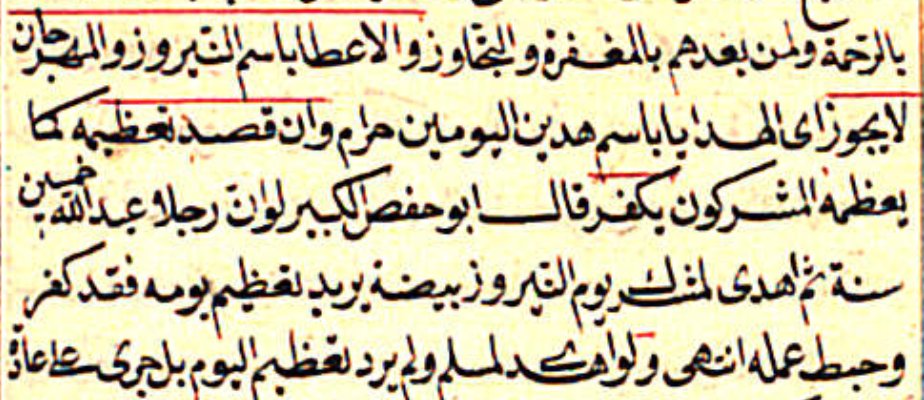
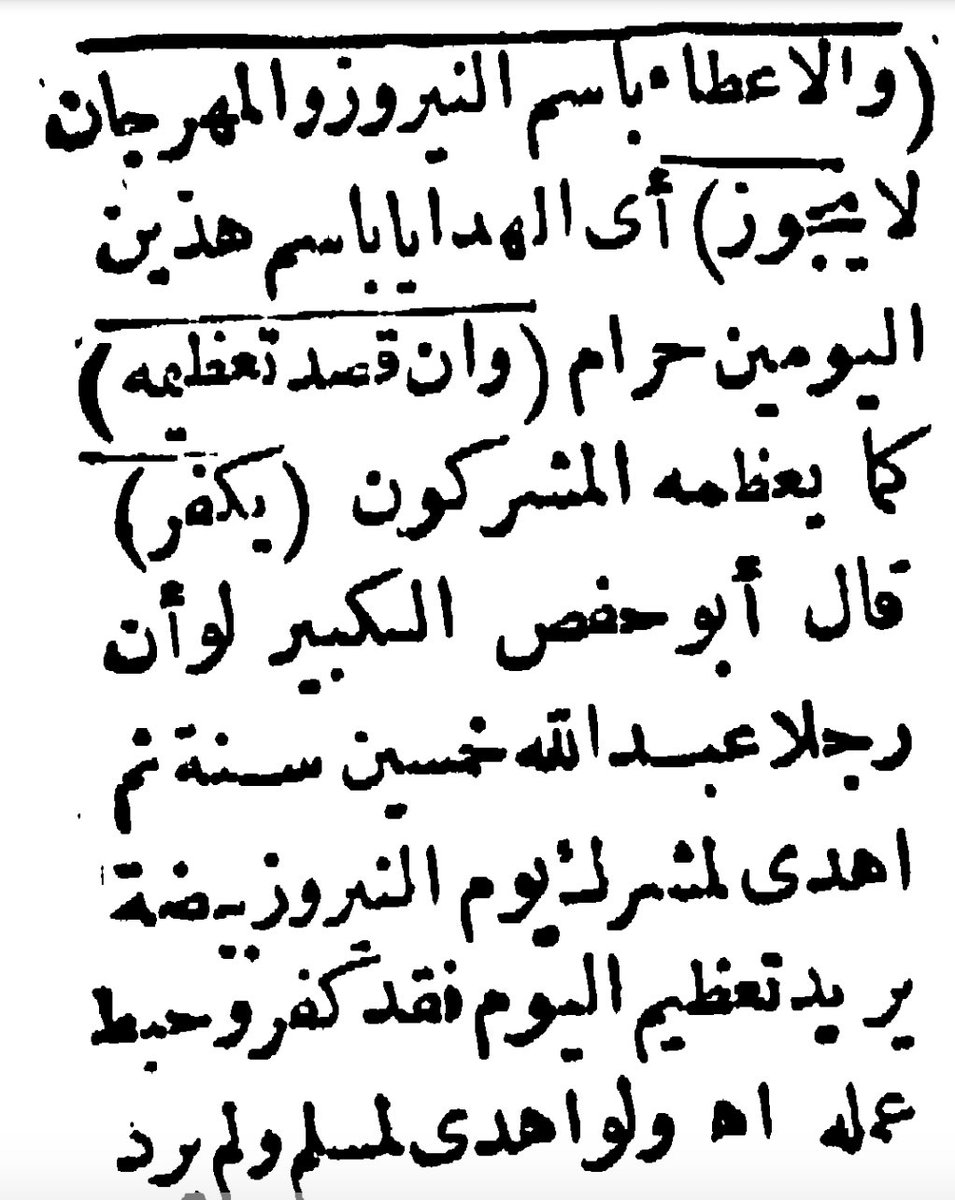
If it is done with the intention of honouring it (i.e. the day of festival), like the Mushrikīn do, then he has committed Kufr.
Abū Ĥafş al-Kabīr said: ❛If a man worshipped Allāh for 50 years then he gifted an egg to a Mushrik on the day of Nayrūz intending to honour that day,
Abū Ĥafş al-Kabīr said: ❛If a man worshipped Allāh for 50 years then he gifted an egg to a Mushrik on the day of Nayrūz intending to honour that day,
then indeed he has committed Kufr and his deeds are lost.❜❞
This is also mentioned in Baĥr ar-Rāyiq, Fatāwā al-Hindiyyah and Jāmiý al-Fuşūlayn.
This is also mentioned in Baĥr ar-Rāyiq, Fatāwā al-Hindiyyah and Jāmiý al-Fuşūlayn.
Muftī e Aáżam e Holland Mawlānā Muftī Ábdul Wājid Nayyar al-Qādirī al-Ĥanafī [1352-1439 AH / 1934-2018 CE] writes in Fatāwā e Europe:
❝It is Ĥarām for Muslims to decorate their houses with what those people (Kāfirs) do, during their festivals. Then to give them gifts on this

❝It is Ĥarām for Muslims to decorate their houses with what those people (Kāfirs) do, during their festivals. Then to give them gifts on this
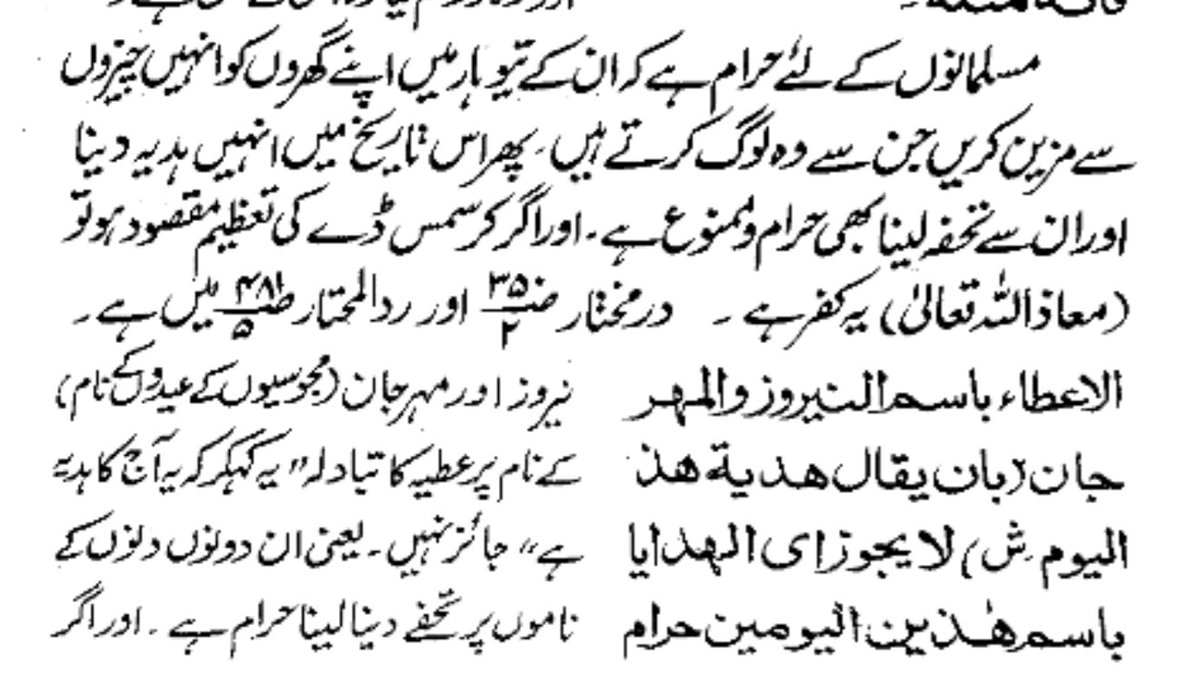

date, and to receive gifts from them is also Ĥarām and prohibited. If the intention is to honour Christmas Day, then this (máādhAllāh) is Kufr.
It is in Durr e Mukhtār and Raddu'l Muĥtār:
❛It is not permissible to give gifts in the name of Nayrūz and Mihrijān, meaning that
It is in Durr e Mukhtār and Raddu'l Muĥtār:
❛It is not permissible to give gifts in the name of Nayrūz and Mihrijān, meaning that
giving and receiving gifts in the name of both these days is Ĥarām. If it is done with the intention of honouring it [i.e. the festival], like the Mushrikīn do, then he has committed Kufr.❜
As with gifting, exchanging congratulations [i.e. Merry Christmas] is also Ĥarām and
As with gifting, exchanging congratulations [i.e. Merry Christmas] is also Ĥarām and
impermissible, from which it is necessary for Muslims to refrain.❞
A good summary of these rulings is mentioned by Ábdullāh al-Mujaddidī al-Naqshbandī:
❝Please safeguard your faiths and do not be carried away to hell in a handbasket, along with the zindiiq perennialist sufis.
A good summary of these rulings is mentioned by Ábdullāh al-Mujaddidī al-Naqshbandī:
❝Please safeguard your faiths and do not be carried away to hell in a handbasket, along with the zindiiq perennialist sufis.
No true Ahlus Sunnah Sufi master has ruled it permissible (or worse yet, recommended) to wish the kafirs on their festivals or to offer them gifts to honor their festivals.
According to Muslim fuqahaa, visiting their christmas gatherings and parades is haram, if done for
According to Muslim fuqahaa, visiting their christmas gatherings and parades is haram, if done for
entertainment, or mere sightseeing. It makes one a kafir if done with the intention to honor their religions, their religious days and their traditions.
The same applies to putting their signs in your homes like the christmas trees or reindeer, or teaching them to your children,
The same applies to putting their signs in your homes like the christmas trees or reindeer, or teaching them to your children,
or letting your children be swayed by santa at the malls and other venues. Honoring their festivals and observing them at your own homes by exchanging gifts and so on and teaching your children to do so is absolute kufr and takes one outside of Islam.
See the rulings of our fuqahaa – even praising or lauding the traditions of the kuffaar takes one outside of Islam.❞
• • •
Missing some Tweet in this thread? You can try to
force a refresh













